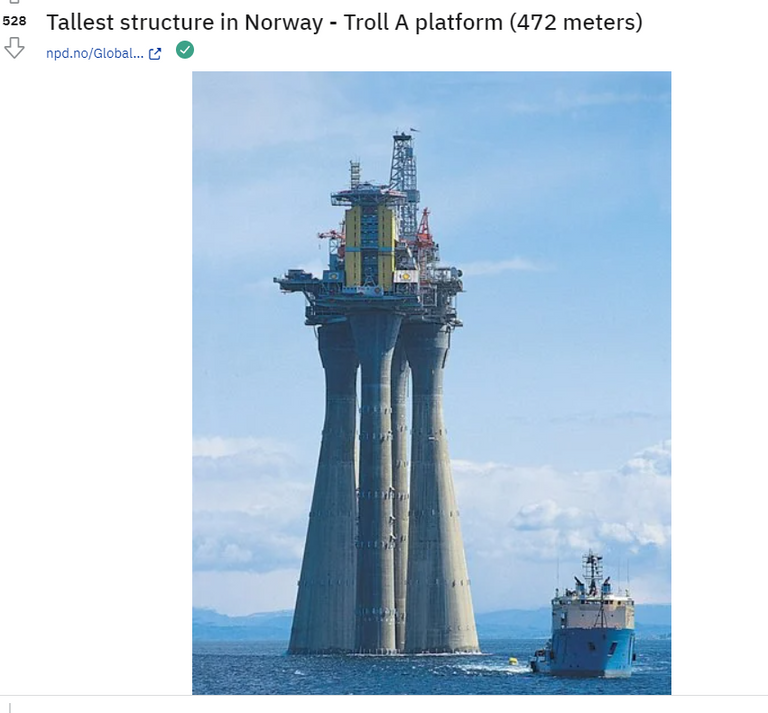Containing about 40 percent of total gas reserves on the Norwegian continental shelf (NCS) the Troll field represents the very cornerstone of Norwegian gas production. The field consists of the main Troll East and Troll West structures in blocks 31/2, 31/3, 31/5 and 31/6 in the North Sea.
The Troll field is located in the northern part of the North Sea, about 65 kilometres west of Kollsnes near Bergen.
Troll is also one of the largest oil fields on the NCS. In 2002 the oil production totalled more than 400,000 barrels per day.
Equinor is the operator of the Troll A, B and C platforms and the landfall pipelines, whereas Gassco is the operator for the gas processing plant at Kollsnes on behalf of Gassled. Equinor is the technical service provider for Kollsnes operations. The enormous gas reservoirs 1,400 metres below sea level are expected to produce for at least another 70 years.
Proven in 1979
Norske Shell was appointed operator when block 31/2 was awarded in April 1979. A large gas discovery with an underlying oil zone was proven later the same year. The block was declared commercial in 1983.
The neighbouring blocks were awarded to then Statoil, now Equinor, Norsk Hydro and Saga Petroleum in 1983.
Block 31/2 contains 32 percent of the Troll field’s reserves, whereas the three other blocks hold the remaining 68 percent.
The licence terms for block 31/2 specified that we could take over the operatorship of this acreage eight to 10 years after the field was declared commercial.
In 1985 the licences were unitised, allowing Troll to be developed as a single unit. We took over the operatorship of Troll Gas on 19 June 1996, whereas Hydro started production from Troll Oil in the autumn of 1995.
Troll Gas
Troll Gas consists of the Troll A platform, the gas processing plant at Kollsnes near Bergen, and the pipelines between the platform and onshore plant.
Norske Shell was responsible for the first Troll East gas development phase, which received the green light from the Norwegian parliament in December 1986. Four years later we agreed with Shell to move the processing facilities originally due to be installed on the A platform to a plant onshore at Kollsnes near Bergen. This made it possible to build a simpler offshore gas production platform than originally planned, with less crew members.
The Troll A Condeep platform is the tallest structure ever moved by people over the surface of the Earth. Its gravity-based substructure has been built for a producing life of 70 years. Troll A was the first platform on the NCS to receive power from shore.
We took over the Troll Gas operatorship from Norske Shell on 19 June 1996 with gas coming on stream in the first half of that year, marking the completion of the gas development. Gas deliveries from field under the Troll sales agreements started on 1 October the same year. Up until then the commitments in the agreements that entered into effect on 1 October 1993 had been met by deliveries from the Sleipner East field in the North Sea.
As gas is produced in the Troll field, the pressure in the reservoir drops. More compression is therefore needed to help drive the gas production through the pipelines to Kollsnes. Consequently, four compressors have been installed on the A platform, powered from shore. As a result, there are zero carbon dioxide and nitrogen oxide emissions from the installation and from the gas processing plant onshore.
Up until August 2021 the Troll West oil was produced towards Troll B and Troll C. In August 2021 the Troll West gas cap was put on stream through eight subsea wells producing towards Troll A. This project increases the Troll gas production by 347 billion standard cubic metres.
Troll Oil
The Troll B and Troll C platforms produce from the thin oil-bearing layers in Troll West on the Troll field in the North Sea. Troll B is a floating processing and accommodation platform with a concrete substructure, whereas Troll C is a similar platform with a steel jacket.
The oil-bearing layers are between 22 and 26 metres in the Troll West oil province, and between 11 and 13 metres in the Troll West gas province. In order to recover oil from these thin oil layers, it has been necessary to develop advanced drilling and production technology.
The Fram, Fram H-North and Byrding field developments consist of subsea installations tied into the Troll C platform by pipelines. The well stream from the fields is processed on this platform.
Location: Blocks 31/2, 31/3, 31/5 and 31/6 in the North Sea
Production start: Troll Oil, 19 September 1995
Production: Oil and gas
